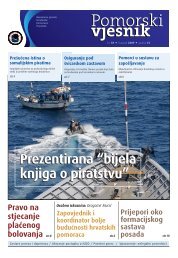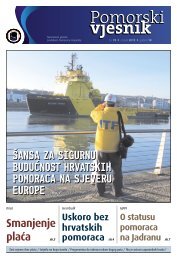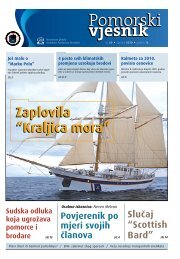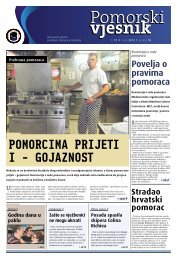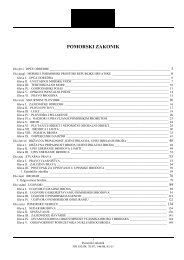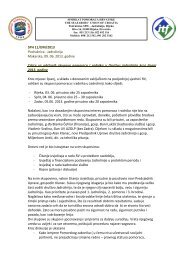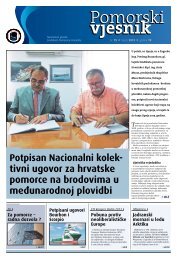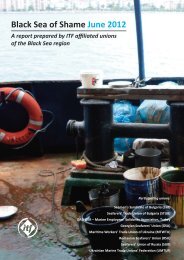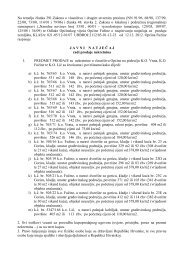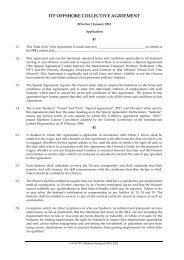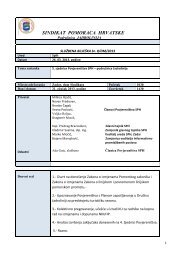Konvencija o radu pomoraca, 2006 (engleski i hrvatski jezik)
Konvencija o radu pomoraca, 2006 (engleski i hrvatski jezik)
Konvencija o radu pomoraca, 2006 (engleski i hrvatski jezik)
Create successful ePaper yourself
Turn your PDF publications into a flip-book with our unique Google optimized e-Paper software.
(h) electronic equipment such as a radio, television, video recorders, DVD/CD player, personal computer<br />
and software and cassette recorder/player;<br />
(i) where appropriate, the provision of bars on board for seafarers unless these are contrary to national,<br />
religious or social customs; and<br />
(j) reasonable access to ship-to-shore telephone communications, and email and Internet facilities,<br />
where available, with any charges for the use of these services being reasonable in amount.<br />
5. Every effort should be given to ensuring that the forwarding of seafarers’ mail is as reliable and<br />
expeditious as possible. Efforts should also be considered for avoiding seafarers being required to pay<br />
additional postage when mail has to be readdressed owing to circumstances beyond their control.<br />
6. Measures should be considered to ensure, subject to any applicable national or international laws<br />
or regulations, that whenever possible and reasonable seafarers are expeditiously granted permission<br />
to have their partners, relatives and friends as visitors on board their ship when in port. Such measures<br />
should meet any concerns for security clearances.<br />
7. Consideration should be given to the possibility of allowing seafarers to be accompanied by their<br />
partners on occasional voyages where this is practicable and reasonable. Such partners should carry<br />
adequate insurance cover against accident and illness; the shipowners should give every assistance to<br />
the seafarer to effect such insurance.<br />
Guideline B3.1.12 - Prevention of noise and vibration<br />
1. Accommodation and recreational and catering facilities should be located as far as practicable from<br />
the engines, steering gear rooms, deck winches, ventilation, heating and air-conditioning equipment and<br />
other noisy machinery and apparatus.<br />
2. Acoustic insulation or other appropriate sound-absorbing materials should be used in the construction<br />
and finishing of bulkheads, deckheads and decks within the sound-producing spaces as well as selfclosing<br />
noise-isolating doors for machinery spaces.<br />
3. Engine rooms and other machinery spaces should be provided, wherever practicable, with soundproof<br />
centralized control rooms for engine-room personnel. Working spaces, such as the machine shop, should<br />
be insulated, as far as practicable, from the general engine-room noise and measures should be taken to<br />
reduce noise in the operation of machinery.<br />
4. The limits for noise levels for working and living spaces should be in conformity with the ILO<br />
international guidelines on exposure levels, including those in the ILO code of practice entitled<br />
Ambient factors in the workplace, 2001, and, where applicable, the specific protection recommended<br />
by the International Maritime Organization, and with any subsequent amending and supplementary<br />
instruments for acceptable noise levels on board ships. A copy of the applicable instruments in English<br />
or the working language of the ship should be carried on board and should be accessible to seafarers.<br />
5. No accommodation or recreational or catering facilities should be exposed to excessive vibration.<br />
Regulation 3.2 - Food and catering<br />
Purpose: To ensure that seafarers have access to good quality food and drinking water provided under<br />
regulated hygienic conditions<br />
1. Each Member shall ensure that ships that fly its flag carry on board and serve food and drinking water<br />
165



